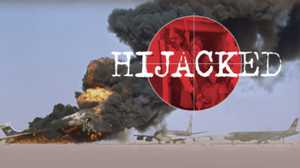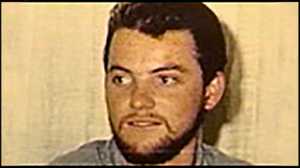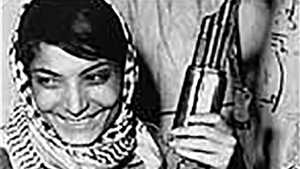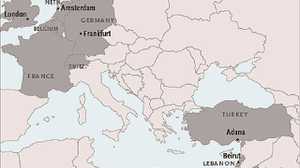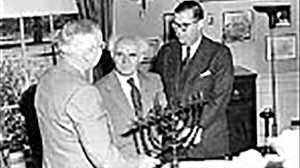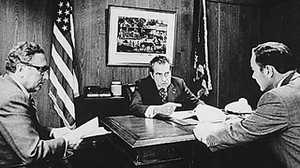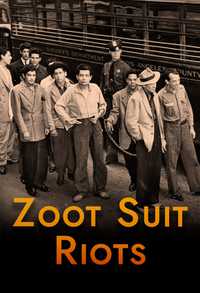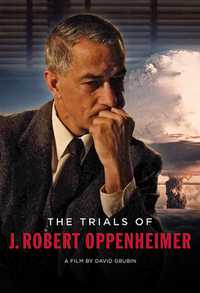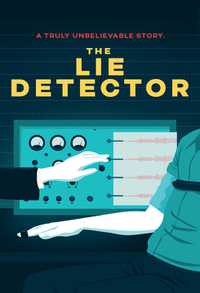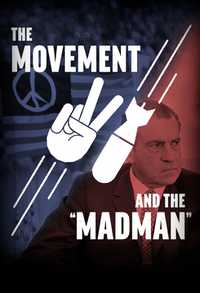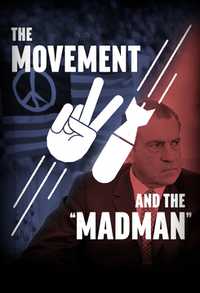Narrator : On the morning of September 6th, 1970, three teams of Palestinian hijackers -- all in their mid-20s -- arrived at different European airports. They were going to hijack three planes bound for the United States They would divert them to a landing strip in the Jordanian desert, hold passengers and crew as hostages, and use them to gain the release of Palestinian militants held in Europe and Israel. The plan was the brainchild of a small guerrilla group, the PFLP -- the Popular Front for the Liberation of Palestine.
September 6, 1970
DAY 1
Narrator: The first targeted plane was El Al flight 219 from Amsterdam to New York. Four hijackers were assigned to take it over, including a Palestinian woman, Leila Khaled.
Leila Khaled, Hijacker: We knew that the plane had armed guards. But who could resist four people armed with guns and hand grenades? We thought they would be afraid of us.
Uri Bar Lev, Captain: We began the pre-flight check-ups. Then the El Al station manager and the head of security came in to the cockpit. They told me: "Listen, we have four suspicious passengers." I asked, "Why are they suspicious?" The head of security told me that they all bought their tickets in advance, but they all came in the last minute to pick them up. Two had bought tickets for first class and two for economy. Those from economy class were light-skinned. Those who had bought tickets for first class were black. They had Senegalese passports and their passport numbers were in sequence; one ended in five, the other one ended in six.
Narrator: Captain Lev decided to allow Khaled and her partner, Patrick Arguello, a Nicaraguan-American sympathetic to the Palestinian cause, to remain on the flight. He had the two Palestinians with suspicious passports removed.
Michal Adar, Flight Attendant: About 20 minutes after taking off, when the plane had almost reached its cruising altitude, we heard a scream from the economy section. The purser told me to go back to economy and see what was happening.
Leila Khaled: We ran towards the cockpit. We passed through the first class -- it was a matter of seconds. I heard some shooting and then I saw someone in first class grabbing the telephone and trying to call someone.
Michal Adar: I entered the first class cabin. It was empty. Then I saw a fist tear the curtain. A nice looking man in his early twenties was looking at me. He had a grenade in one hand, a pistol in the other. He said, in English, "Open the cockpit door."
Leila Khaled: I showed them the two activated hand grenades and asked them to open the door. One of the flight attendants was also banging on the door saying, "Open! Open!" Someone looked through the peephole but did not open the door.
Uri Bar Lev: We heard the knocks on the door and the purser Abraham rang, calling us on the intercom. He told me: "there are a male and a female hijacker. They demand that you should open the cockpit door, otherwise they will kill and blow up the plane.
I decided that we were not going to be hijacked. The security guy was sitting here ready to jump. I told him that I was going to put the plane into negative-G mode. Everyone would fall. When you put the plane into negative, it's like being in a falling elevator. Instead of the plane flying this way, it dives and everyone who is standing falls down.
Narrator: In the chaos created by the sudden dive of the plane, several passengers overpowered Khaled. One of the air marshals on board shot Arguello.
Less than an hour after take off, El Al flight 219 made an emergency landing in London.
Leila Khaled was arrested. Patrick Arguello was taken to a local hospital, where he was declared dead upon arrival.
In failing to hijack the El Al plane, the PFLP had lost its most important target. It had hoped to use the Israeli passengers on board to force Israel to release Palestinians held prisoner.
But the multiple hijacking plan had not gone completely awry.
Earlier that morning, on TWA flight 74 from Frankfurt to New York, hijackers had met little resistance.
Rudi Swinkels, Purser: I saw a passenger running towards first class. I ran after him and when he came to first class to the cockpit, he turned around, had a gun in his hand, and pointed the gun at me, and said, "Get back, get back." So right away, I dove behind the bulkhead first class divider and I hid behind it, over here.
Rivke Berkowitz, Passenger: A woman's voice came over the loud speaker and she said, "This is your new captain speaking. This flight has been taken over by the Popular Front for the Liberation of Palestine. We will take you to a friendly country with friendly people."
Narrator: Swiss Air flight 100 from Zurich to New York was seized minutes later and diverted. The two planes carrying more than 300 hostages were now headed toward the Middle East.
Marvin Kalb, Journalist: I heard about the story because, in fact, the CBS Newsroom in Washington alerted me. This was America's introduction to global terrorists. America really had not had any serious exposure to terrorism before this time. And it took another day or so before many of us realized that most of the people on the planes were Americans.
Walter Cronkite (archival): Palestinian guerrillas in a bold coordinated action created this newest crisis Sunday, and in so doing, they accomplished what they set out to do. They thrust back to the world's attention a problem diplomats have tended to shove aside in hesitant steps towards Middle East peace.
Narrator: By early evening President Richard Nixon had cut short his Labor Day weekend in California and returned to Washington.
The White House's primary cause for concern was the delicate Cold War balance of power in the Middle East. At the time, the U.S. was allied with Israel and the Soviet Union with most Arab countries. Nixon decided that he and his National Security Advisor, Henry Kissinger, would personally manage the crisis.
Marvin Kalb: We have to remember that in those days, the fundamental issue for Nixon and Kissinger was: in what way does a foreign policy issue affect the balance of power between the United States and the Soviet Union? That was the thing right upfront in their minds. And at this point, they did not know immediately how it would affect the balance, but they knew it could, and that's what was important.
Narrator: Three planes had been targeted for hijacking on September 6. There would soon be a fourth. After being removed from the El Al flight, the two Palestinians with Senegalese passports managed to purchase first class tickets on Pan Am flight 93 from Amsterdam to New York.
John Feruggio, Flight Director: We were ready for take off in Amsterdam, and the airplane came to an abrupt stop in the middle of the runway. And Captain Priddy called me up into the cockpit and says, "I'd like to have a word with you." I went up to the cockpit, and he says, "We have two passengers by the name of Diop and Gueye." He says, "Go down and try to find them in the manifest, because I would like to have a word with them."
Pat Lavix, Co-Pilot: Captain Priddy said to them, "I apologize for asking but I am going to have to search you. And they said, "Search us."
John Ferruggio: So Captain Priddy sat them down at these two seats over here. He gave them a pretty good pat. They had a Styrofoam container in their groin area where they carried the grenade, and the 25mm pistols. But this we found out much later.
Control Tower: This is clipper 93 clear for take-off...
Pat Lavix: This was all prior to take-off and then we talked to the company, and the company agreed, go ahead, so now we've been given permission to take off and we did.
Narrator: With their hidden weapons, the hijackers easily seized the plane and forced the pilot to fly toward the Middle East.
By late afternoon, news of the multiple hijackings reached Amman's Intercontinental Hotel.
Gerald Seymour, Journalist: It's a Sunday afternoon, the bar would have been open and then the first telex came through telling us of the hijacking. So we had the El Al, then we were hearing of a TWA, then we were hearing of a Swiss Air, then we were hearing of a Pan American, and now we were getting -- you know -- a bit fidgety because this is on a scale of hijacking that none of us had seen before. As dusk came, I remember the first message coming in, which really set us a light, that planes were believed to be heading towards Jordanian airspace.
Narrator: The PFLP was part of a growing Palestinian guerrilla movement based in Jordan. Stunned by Israel's victory over their Arab allies in the Six Days War three years earlier, many Palestinians felt that they needed to take control of their fate -- by any means possible.
George Habash, PFLP, Co-Founder: What happened in the 1967 War destroyed our dreams. We said that the world does not understand or know about the Palestinian problem. This is how the idea of hijacking planes came about. Let the whole world know about the crisis that happened to us.
Bassam Abu Sharif, PFLP, Spokesman: The main goal of this operation was to gain the release of all of our political prisoners jailed in Israel in exchange for the hostages.
William Quandt, National Security Council: This was in an era when Vietnam had demonstrated that small, backward countries could stand up to Superpowers, and there was some sense in which the Palestinians were trying to emulate that. I think the Palestinians generally -- and the PFLP within the Palestinian movement -- knew they had a weak hand. The guerrilla war option was not going to work quite as it had in Vietnam. So I think they were always were trying to find ways to do things that had highly dramatic content to get attention.
Narrator: The hijacked airliners were being flown to an abandoned airstrip in the Jordanian desert: a remote site under Palestinian control. The hijackers had dubbed it "Revolution Airport."
Bassam Abu Sharif: One of our commanders asked me to go to Revolution Airport. I asked, "Where is that airport?" He said, "Some guys will lead you. But it is not an airport. It is a desert."
Abu Samir, "Revolution Airport," PFLP: In this area the ground is very hard. The largest planes on earth could land there. I asked our commander, "why did you choose this place?" He told me that a geologist had confirmed that the strip could support anything -- even if the Devil walked on it.
In order to make an airport, what should one do?
We brought 200 barrels and gallons of diesel and a group of fighters to protect the area. We filled barrels with dust and with diesel-soaked rags, and we sat and waited.
Narrator Revolution Airport was in one of the many areas of Jordan controlled by Palestinian factions, that had united under an umbrella group, the Palestinian Liberation Organization.
Talcott Seelye, State Dept. Task Force: We had in Jordan a situation where the PLO had created a state within a state. They had roadblocks all over Amman, the capital. They were controlling the North...
They were challenging the leadership of King Hussein.
William Quandt: The first time I ever went to Jordan, it was in the early part of 1970 and you literally could not travel around in Amman without a PLO escort. It as if the Jordanian state had ceased to exist.
Ambassador Seelye : So you had the hostage crisis, which was kind of a spark for an already incendiary situation.
Narrator: TWA Flight 74 from Frankfurt was the first to land at Revolution Airport, touching down at 6:45pm. On board were 145 passengers and 10 crewmembers.
Rudi Swinkels, Purser: We circled a couple of times, and after we landed we looked outside and we saw, like torches stuck in oil drums.
Abu Samir: We were afraid. Could you imagine how the passengers felt? We were anxious that the operation would fail . ..it was a big responsibility.
Rivke Berkowitz, Passenger: As soon as we touched ground, the plane was rushed by people in army fatigues with Kafias on, and with all kinds of weaponry that I had not seen in my life.
Narrator: Barely ten minutes later, Swiss Air flight 100 from Zurich landed with 143 passengers and 12 crew members on board.
Paul Fehse, Passenger: I looked outside. I see nothing. And then, out of the blue -- boom -- we hit hard. We hit so hard I thought we had crashed. And everybody was rushing for the doors, thinking the plane was going to blow up.
Bassam Abu Sharif: I saw an old lady opening her purse taking dollars bills. She tried to put them in the hand of one of our fighters. I spanked her hand. She was scared to death. I said, "Take back your money. We are not thieves; we are people fighting for freedom."
Narrator: "The desert grew very cold at night," Bassam Abu Sharif would later write in his diary. "My comrades went around wiring detonators to large lumps of plastic explosives placed under the seats."
Narrator: There was still one more hijacked plane in the air: Pan Am flight 93. Its pilot, Captain John Priddy, convinced the hijackers that the 747 was too big to land in the desert. After refueling in Beirut, the plane headed towards Cairo.
John Ferruggio: We took off out of Beirut, and shortly after that I saw the demolition individual with a suitcase and he was wiring up the airplane with dynamite. And I said to him, "What's going to happen to this airplane?" And he said, "What do you care about this imperialistic airplane?" I said, "What about my imperialistic ass and my passengers?"
Pat Lavix: We had to circle. The hijackers would look out the window and they would confirm: "Yes, indeed, this is Cairo." They could tell even though it was nighttime.
John Ferruggio: And I said to all the attendants: "Now hear this, and hear it good. When this plane comes to a complete stop in Cairo..." [which was our destination point] I said, "Don't wait for me, don't wait for the captain, and don't wait for Jesus Christ. We are going to evacuate the plane, like right now. I looked around and saw this gentlemen lighting up fuses on dynamite as we were descending.
Narrator: Flight director John Ferrugio hurriedly gave evacuation instructions, which one of the passengers managed to record on a tape deck.
John Ferruggio (recorded evacuation order): We don't want you to do this here so that nobody will get hurt. Just pay attention to what your stewardess says. At each door, go down to the bottom of the ramp and then get away from the aircraft."
Pat Lavix: We were probably no more than 40 or 50, 60 feet away from the airplane and the entire cockpit blew off. When I looked up at the nose of the airplane, it was gone, and I could see the captain's seat was sitting on the floor all by itself.
Narrator:All the passengers and crew managed to escape safely. The hijackers were arrested by Egyptian police.
DAY 2
Gerald Seymour: We are bumping along a dirt road, seeing absolutely nothing, when over the top of the hill comes a Jeep Land rover, a great dust storm bellowing along behind it. We waved the chap down; it's an Italian engineer. "Excuse me, Sir, have you seen any airplanes?" (...which might seem a pretty damn fatuous question...) "Yes," he said, "over there." "Thank you." And we powered back in, and bump along a bit further, and then we go over a rim ... It's a hell of a long time ago, and I can see that sight absolutely clearly in my mind now. They were laid out like little children's toys. We just stopped there in amazement because we were in the middle of nowhere.
Narrator: Mid-morning, the PFLP issued their first ultimatum: they would blow up the planes with their passengers onboard, unless Leila Khaled, and Palestinian militants imprisoned in Israel and Europe were released within 72 hours.
The U.S. and European countries whose citizens were being held hostage, agreed to negotiate with the PFLP via the International Red Cross. Israel refused to participate in the negotiations.
Gerald Seymour: The PFLP spokesman had decided that having got the media there -- and our ranks had swelled during the course of the day -- what he needed to do was to have a news conference.
Press Conference:
Q: "Excuse me we want the captain and the stewardess to tell us about the sanitary condition on the TWA plane. How things are..."
A: "Would you like to smell? What do you think -- they don't have water. What do you think, asking this kind of questions?"
Gerald Seymour: The spokesman for the PFLP, Bassam, thought then that there could be some sort of give-and-take of statements.
Press Conference
Q: "The American girl here, can she just tell us how the passengers are?"
A: "We are very crowded and I think the women and especially the children are very restless."
Gerald Seymour: At that time, 1970, it would have been believed that by fog horn statements, they could convince the outside world -- beyond the boundaries of Israel, Jordan, Lebanon -- of the rightness of their cause.
PLFP Card:"The fact that Imperialist interests are linked with the existence of Israel will make our struggle against Israel, a struggle against Imperialism.
Gerald Seymour: This today would seem to show a quite stunning naivety. It would seem to show almost a childlike innocence.
Walter Cronkite (archival): Well, here is the situation on that airstrip in the Jordanian desert thirty miles from Amman. Arab guerrillas hold as captives some 300 nationals from the United States, Britain, West Germany, Switzerland, Israel and even now from some Arab lands.
Talcott Seelye: It was an extremely stark moment. It was something that caught us completely unaware. We never thought that would happen, and it was the first time it had happened.
Narrator: The White House faced a dual crisis: a hostage situation with hundreds of American lives in danger and a pro-American government, Jordan, at the point of collapse.
William Quandt: The PFLP knew on some level that King Hussein could not remain a king while having his country basically occupied by these armed and independent actors. So when they acted this way, they knew that it would bring about some kind of confrontation with King Hussein.
Marvin Kalb: If the Palestinian extremists were to take control of a country like Jordan, how does that tip the balance? The Soviet Union had a very close relationship then with the Syrian regime and with the Egyptian regime. This was the kind of crisis that evoked, in Kissinger's mind, many historical parallels. Just as pre-World War I, a shot fired in Sarajevo could trigger a World War. In Kissinger's mind, a shot fired in Amman, Jordan or Jerusalem, likewise could trigger a World War.
John Sheehan, CBC Reporter (archival): The 305 hostages were told that they would be killed if the governments of Great Britain, Switzerland , West Germany and Israel refuse to release Palestinian prisoners.
Narrator:The increasing friction in Jordan between the Army and Palestinian guerrillas was evident at Revolution Airport. Palestinian militants guarding the planes were themselves surrounded by Jordanian troops, tanks and armored personnel carriers. It was a tense and unpredictable standoff.
Abu Samir: The Jordanian general came and assessed the situation. We negotiated with him. We told him you should take your troops a mile back and we will free the women and children.
CBS Reporter: The Jordanian Chief of Staff has been negotiating with the Commandos. He succeeded in getting them to release the women and children...
Rivke Berkowitz, Passenger: They said that they wanted all the women and children off the plane, and I said to my husband, "I'm not going." I said, "I want us to stay together." And he said, "You have to go. Whatever is going to happen it will be a lot easier if I know that you and Talia are safe."
As we leave they ask our names, and they ask our religion. I just said I was Jewish, because all my life I had grown up in the shadow of the Holocaust, and I always thought that one day my turn was going to come. And I thought, this is my turn, so I didn't think twice about it. But the girl who was following me said to them, "but what do you want to know?" and he said, "Ah, Jewish?" And she said, "No, I am Protestant." And I don't think they saw us as a group of people who were Americans and related to each other as Americans. I didn't realize at the time, that what they were doing was they were dividing us up.
Bassam Abu Sharif (in desert press conference)
Q: "Why are you keeping the Jewish women and children?"
A: "They are not kept because they are Jewish. They are kept just for interrogation, the reason I mentioned: the dual citizenship -- Israel and the United States of America."
Barbara Mensch, Passenger: The two friends that I was with -- one was Jewish, and my oldest friend Nancy, who was not Jewish -- when they separated us... you know, it was the first time in my life that I had been separated, that I had been identified as Jewish, and something different happened to me... that my treatment was different because I was Jewish.
William B. Quandt: The Palestinians tried to make an argument, especially the leftists, that they were not anti-Semitic, but that they were anti-Zionist.
PFLP postcard: (A Lenin quote) "The idea of a Jewish Nation is an erroneous Zionist idea and reactionary in essence."
William B. Quandt: They did not go around asking people about their political views; they asked them about what their religion was. So, it is not a smart thing to do if you are trying to combat the common view that you were somehow focusing on people as Jews or non-Jews, rather than Zionists and non-Zionists.
Rivke Berkowitz: We were still standing there and when they finished loading, they told us to go back on the plane. So we got on the plane, and I went to my husband and I said, "Well, now at least whatever we have to face, we'll face it together."
Gerald Seymour: The light was going down, and that sort of sudden drift towards the dusk that you have in that part... And we would have needed to get back to Amman -- all the television crews, all the newspapermen who had to file. And you almost have a feeling of disgust and shame as a reporter, that you're going back to your air-conditioned hotel, the kitchen's on the tap, and the bar is open waiting for you. And you are leaving people behind, who are in, you know, in a bad and unpleasant and frightening situation.
Rivke Berkowitz: The electricity is turned off in the plane, and they hang a lantern in the middle of the plane, which is our one source of light. Some of the terrorists came on the plane and woke up one of the flight attendants, and said we're going to call some names of people that we want to interview. And I knew that they were going to say out names. I don't know how I knew... I just, I was just waiting for it -- to hear Berkowitz -- and the first name was Berkowitz. And I woke up my husband and I said to him, "you better put on your shoes. I think they are taking you off the plane."
Rudi Swinkels: The women -- the wives -- are sitting there, and screaming, you know, because: "Oh my god, I'm never going to see my husband again." You know, and they were interrogated and taken off the airplane after that.
Rudi Swinkels:
Q: What did you feel when they were taking the men off the plane?
A: I thought I was never going to see them again. They're going to kill them.
Narrator: PFLP gunmen took Jerry Berkowitz, three U.S. government employees and two rabbis to a hideout 100 miles away, in case Israel attempted a rescue operation at Revolution Airport.
Rivke Berkowitz: I sat with the wives of those men who were taken with my husband, and they said, "Oh, they'll be back shortly." And we sat all night, and we waited for them to come back, and they didn't come back.
DAY 3
Dan Rather (archival): The White House is showing signs of edginess and grave concern. For the first 36 hours, the White House publicly all but ignored the hijackings in comment and action. The White House is doing its best not to convey any impression of panic.
Harold Saunders, National Security Council, 1961-: The question really was: what could you do with a couple of airplanes out in the desert and no American military presence nearby? All these crises were frustrating because you did not know what to do exactly about them.
Dan Rather (archival): Tonight, President Nixon called a meeting of his top advisers. But indications of urgency are beginning to pile up in a lot of little ways, including the suddenness in which tonight's Presidential meeting was announced.
Narrator: After the meeting, Secretary of Defense Melvin Laird received a phone call from the president. Nixon, Laird recalled, wanted to bomb the PFLP forces and facilities near Revolution Airport.
Harold Saunders: President Nixon had a way of... on the spur of the moment, suggesting strong actions, that maybe, on second thought, even he would not have followed through on. And his senior staff somehow had to deal with those instructions. In this case, I think Melvin Laird found that the weather was not good or something and that was the end of the suggestion for bombing. Years later, Secretary Laird would admit that the weather was just an excuse. Given America's involvement in Vietnam, he did not want to drag the nation into a new military adventure.
Narrator: Back at the desert airstrip, the clock was ticking. In a little more than 24 hours, the PFLP deadline would expire.
Bassam Abu Sharif
Q:(over Hostages) Bassam, don't you agree that you are the one who began threatening innocent civilians? What is the difference between then and what is happening now?
A: Yes, I told you. It was a violent act. But there were some conditions. Not to hurt any civilian hostages, but to keep them only for exchange. We were very careful. It was possible that Israel would have attacked. Then it would have been Israel who would have killed them -- not us.
Ali Ghandour, Jordanian Gov't. Negotiator: I talked to some responsible people in the PLO, and particularly in the Popular Front. "Why did you do this? Why do you do this? I mean I don't understand it." They said they'd like to draw the world opinion -- the world attention -- towards the Palestinian cause. I said, "But the world is not your enemy. Those people are innocent people; they are not your enemies. You are not at war with them, and the Palestinian cause is a very beautiful cause. It is a just cause. Why do you make it looks that ugly?"
Narrator: All eyes were now on Jerusalem. Would the Israelis join with the Americans and Europeans and negotiate with the PFLP for the release of the hostages? Or would Prime Minister Golda Meir order a military strike in retaliation?
Golda Meir (archival, press conference): The whole world is watching an atrocity unfold unlike anything we have ever seen before. We're talking about people being held in the desert for days -- hundreds of people. On the radio we hear almost idyllic news that they have some food. But no water. Can you imagine? In the heat of the desert, those children don't have any water. The whole world is watching this ... and the best idea they've come up with is to pay bribes.
Shlomo Hillel, Israeli Minister of Police: At that time we could not even imagine negotiating with terrorists. We wanted to fight them, and thought that we were winning. We knew that giving in to terrorists only encourages them. There is nothing easier than to capture a unprotected non-Israeli plane, hijack it to a remote place and then demand that Israel release its prisoners.
ITN Reporter: The greatest anxiety among the passengers on board must lie with the Jewish hostages, now that the Israeli government have refused to exchange them for captured commandos.
Narrator:Israel's position also made the work of the Red Cross far more complicated. It could offer the PFLP only Leila Khaled and six of her comrades held in Europe, not the thousands of prisoners in Israel that the militants had requested.
Michel Bard, Negotiator, International Red Cross: We were living under pressure from one side, threats from the other. We had to face danger of an outside intervention ... ultimatums and notably the risk of an Israeli military intervention, which was for us, the ultimate risk.
Reporter: Can we go back to this hard question about the deadline? Are you saying that the deadline will be on four a.m., Wednesday? No, four a.m., on Thursday? Four a.m. on Wednesday or Thursday?
Michel Bard: The tension was extraordinary. I believe we were at the dawn of a new war ... and not only a local one.
Walter Cronkite, CBS Special Report (archival): Well, here is the situation as of this morning. The guerrillas have extended the deadline for the expiration for their Ultimatum for the release of their fellow terrorists, giving the International Red Cross an opportunity to negotiate for the release of the plane hostages.
Narrator: Seventy-two hours into the crisis, some 200 hostages were still imprisoned in the desert while the conditions in Amman were deteriorating rapidly.
The 125 women and children who had been released the day before were now under siege in the Intercontinental Hotel.
BBC Reporter (archival, in hotel lobby): In the hotel lobby the area is deserted of guests because there's a sniping battle going on just outside the door here, now.
Narrator: As Jordan slipped into civil war, the hostages' safe haven was fast becoming a battle zone.
Paul Fehse: One morning we woke up -- they were bombing the hotel while we were in it, and shooting it. My friend Joe and I we were at a landing between two floors reading Mad magazines and laughing -- when all of a sudden, we heard machine guns and what sounded like a bomb. One bomb landed near the hotel. Everybody panicked and ran out of their rooms into the halls.
Narrator: On September 9, Jordanian troops managed to escort the 125 hostages out of the country. Two hundred hostages, however, remained stranded in the desert.
Rivke Berkowitz: They brought us water in which they had put chlorine tablets to sterilize it. So what we were drinking was similar to drinking heavily chlorinated, warm pool water. So we only drank it when we were very thirsty and just could not help ourselves anymore. And actually we were like that about going to the bathroom too, because it was so disgusting. You didn't go in there unless you had to.
Abu Samir: In the first two days, we did not have a problem with food. But then, you know, there were hundreds of people and we could not just give them falafel that we ate ourselves. Now I am telling the story in few words, but then it felt like a lifetime. It was a big responsibility, big responsibility.
Gerald Seymour: You have this extremely complex attack plan on four airlines, but what was to happen after that -- I have the impression that they had no comprehension of it at all. They did not have the sophistication, nor, let it be said, did they at that time, have the ruthlessness to press home the initial attack on the airplanes by killing people. They did not have that ruthlessness. Ok, they were to learn it but they hadn't got it then.
Narrator: Once it became clear that the PFLP was not going to execute hostages, its bargaining position weakened. Then, on September 9, a PFLP sympathizer hijacked a British BOAC plane on route to London -- a fourth hijacked plane with 105 passenger and 9 crew members on board.
DAY 7
Barbara Mensch: Each day on the plane, they kept promising to release us. So I thought, Ok, I'll spend another night on the plane, and then I'll get off the next day. We got this everyday; we got a promise, and then they started taking us off. I was one of the first people that they identified to take off ...
Narrator: After evacuating all of the passengers, the PFLP blew up the three planes in succession.
Barbara Mensch: I was scared because we were very close to the planes; the stuff was, you know, parts of the planes were flying out at us. The scary part was being surrounded by the Jordanian army because the PFLP folks had rifles with them and they pointed their guns at us.
Abu Samir: The Army came at that very moment. We told them, "Here are the hostages. If you touch us, either we all die or you let us go."
Barbara Mensch: Then, you know, we got through that moment. I thought, Ok, well, now -- finally, each time it was ok, now finally -- I am going to get out of this situation. And then, we drove in a kind of a caravan, in a line, and all the Jeeps went into one direction and mine went in another.
Narrator: Barbara Mensch and 54 other Jewish passengers and all the male crewmembers were separated from the rest. The remaining hostages, including the BOAC passengers, were taken to the Intercontinental Hotel. Among them was Rivke Berkowitz.
Rivke Berkowitz (archival, news interview):
My husband was on board ...
Q: Where is he now?
A: I don't know.
Q: Do you have a dual Israeli-American passport?
A: I have an American passport.
Q: Does he have an American passport?
A: American passport. We're both American-born.
Bassam Abu Sharif: The PFLP also transferred the passengers who are classified as subjects under interrogation into a more cozy place. And they will be kept there until our prisoners are released.
Barbara Mensch: The next thing I remember is being taken off the Jeep, and being told that I was no longer a hostage, but I was now a political prisoner. And that unless my country did something, I was going to be a political prisoner, for, I don't know, forever. I just remember crying, and I thought, "Oh my god, I am going to be here forever. This is never going to end."
BBC Reporter: The Arab Commandos called this the Revolution Airport. Today, it could be called "Desolation Airport"...
Gerald Seymour: You had an impression that the Palestinians had played it out by the end of that week, and therefore the blowing up of the aircraft was drawing the curtain on the show.
Narrator: Two days later King Hussein ordered his army to fight its way into the Palestinian refugee camps. and uproot the militants.
The growing crisis in Jordan now occupied both the U.S. administration and the Israeli government.
The fighting also overshadowed the negotiations, making them far more complicated.
It took more than two weeks to extricate Barbara Mensch and the remaining hostages from the destroyed Palestinian neighborhoods in Amman. They were exchanged for Leila Khaled and six other PFLP militants.
Several days later, Jerry Berkovitz and five other hostages hidden in a basement were finally freed. All of the hijackers managed to escape.
William Quandt: Palestinians would say, I suppose, that they did not have great choices -- that there weren't ways of getting world's attention by having peaceful demonstrations. Somehow they had to show how dire the situation was by inflicting pain.
But I also think that once you get started with this kind of militancy, it is hard to turn it off. People began to compete for ways of doing other more dramatic blows.
It is difficult to stop once you've developed that as one of your modus opperandi.
Narrator: The unprecedented events of September, 1970 would soon be forgotten.
But they would mark the end of one era and the beginning of another -- a more violent and dangerous time when terrorists would no longer hesitate to take the lives of innocent people.
